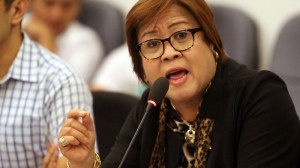De Lima: Media did not breach secrecy law
“The media has every right to report (it),” Justice Secretary Leila de Lima on Wednesday said of the decision by media to publish the Court of Appeals (CA) freeze order on the assets of Vice President Jejomar Binay, his family, and other individuals and companies connected to him.
De Lima dismissed the threats of prosecution against the media issued by Binay’s lawyer, Claro F. Certeza, who cited the confidentiality rule under the Anti-Money Laundering Act of 2001.
“[Speaking] offhand, I don’t think there is a violation there,” the justice official said. “I looked at the Anti-Money Laundering Act (Republic Act No. 9160), (and) the prohibition in that provision is only for… entities [like] the banks, financial institutions and insurance companies (reporting) on… suspicious transactions,” De Lima told reporters in an interview.
Rulings of right of media
“The prohibition is anchored on practical purposes in the sense that… if the order is yet to be served, the subjects, particularly the respondents, should not know about it because they might do things like withdraw their money and close (their) bank accounts (in the) hope of (putting one) over the court,” the justice secretary explained.
Article continues after this advertisement“What is clear is that when the Anti-Money Laundering Council (AMLC) is investigating internally, it’s confidential. In fact officers and personnel [of the council] are bound by the rule even before [the investigation is conducted]. Sharing information is not allowed. At that stage, there is a confidentiality rule,” De Lima added.
Article continues after this advertisementHowever, after a freeze order has been issued and served, the media should not be faulted for reporting about it, according to the official.
“I don’t think the prohibition applies to reporting by media… especially (if there is a) freeze order. I think media has the right to report developments in the case. I’m not aware of any gag order issued,” De Lima said.
“Media has every right to report… I think jurisprudence is replete with [rulings] recognizing the right of the media to report on cases like that,” the justice official said.
Senate President Franklin Drilon and Sen. Francis Escudero echoed De Lima’s position, and said that the media did not breach any confidentiality rule when it reported the freeze order on the 242 bank accounts of Binay, his wife, Elenita, and other allies.
Public document
The CA freeze order is now a “public instrument and a public document,” Escudero said.
Drilon, a former justice secretary who was among those behind the Anti-Money Laundering Act, said the confidentiality clause barred employees and officials of banks and insurance agencies from revealing to the public what they report to the AMLC.
No more prohibition
The law also prohibits the revelation or publication of the filing of a petition for a freeze order in the CA, he said, adding that such revelation or publication of that information would allow the subject to just close the account under scrutiny.
But once the CA issues the freeze order, there is no more prohibition, Drilon said, adding that “the freedom of the press provision prevails (in this case).”
Asked whether the media can divulge the contents of the AMLC report, the Senate President said: “Well, it is part of the order of the court which ordered the freezing. Those are public records. The freedom of the press is primordial in that case. There is no public interest involved anymore.”
Drilon also reiterated that the Liberal Party (LP) had nothing to do with the AMLC request for a freeze of Binay’s assets, and said that the members of the AMLC, which includes the Bangko Sentral governor and the Securities and Exchange Commission chair, are professional bureaucrats.
“Of course, the election is near… and that is why these things are being said (against the LP),” Drilon said.
RELATED STORIES
Warning letter from Binay camp
Media not liable for publishing freeze order on Binay assets—Drilon
